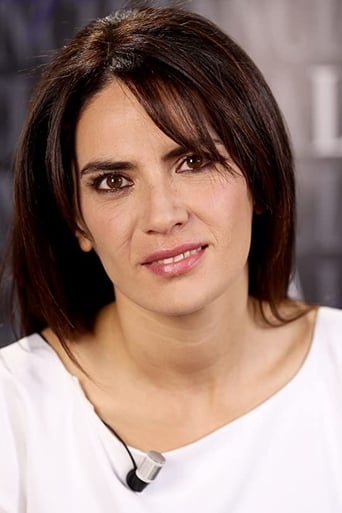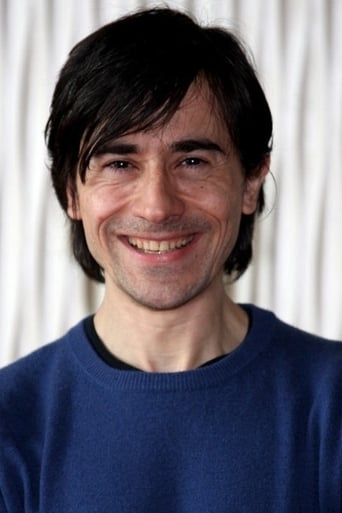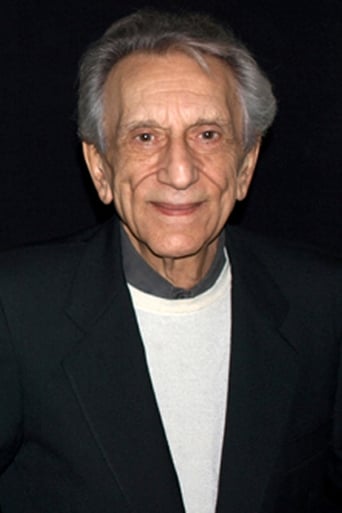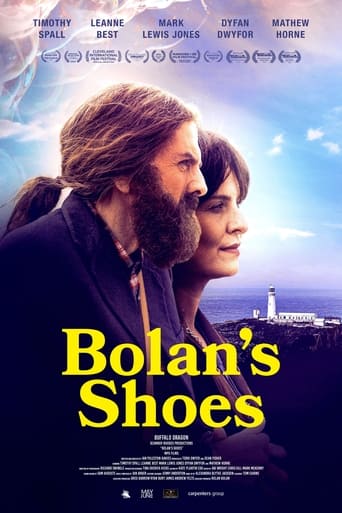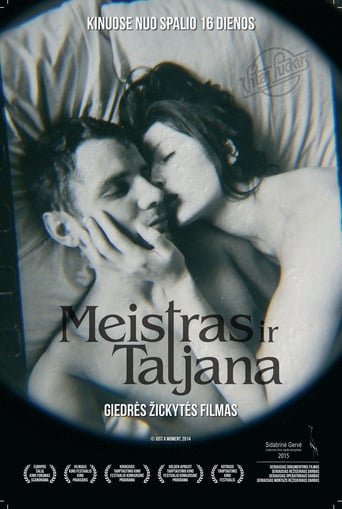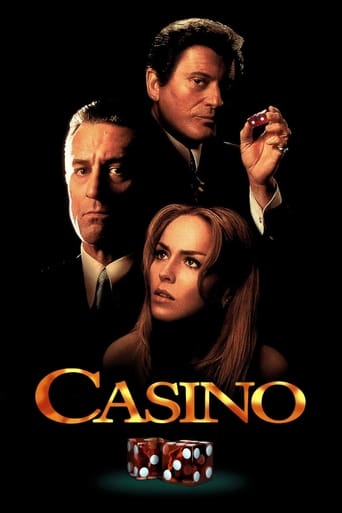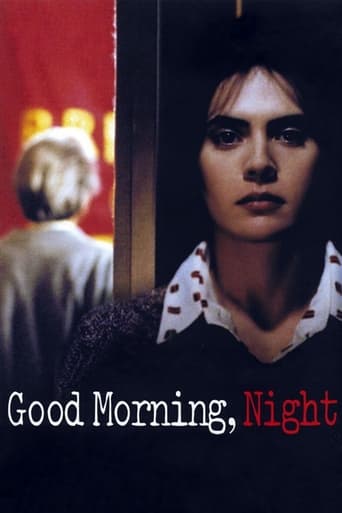
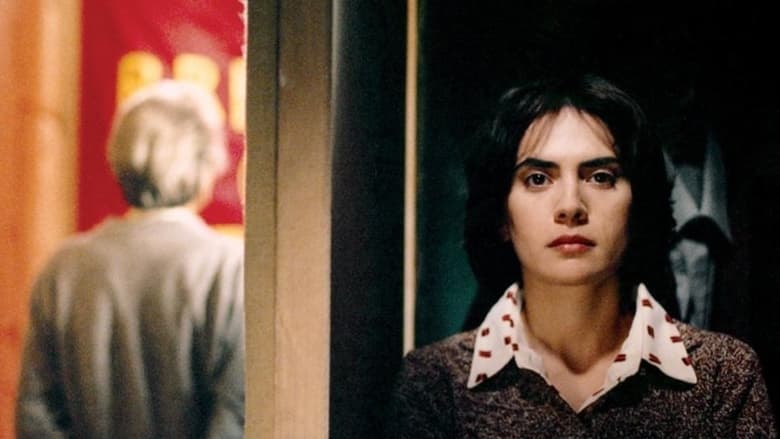
Good Morning, Night (2005)
The 1978 kidnapping and murder of Aldo Moro, president of the most important political party in Italy at the time, Democrazia Cristiana, as seen from the perspective of one of his assailants -- a conflicted young woman in the ranks of the Red Brigade.
Watch Trailer
Cast
Similar titles

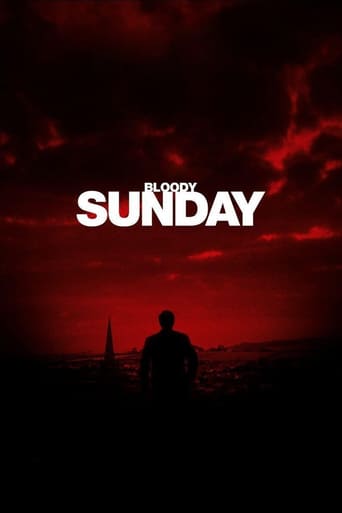
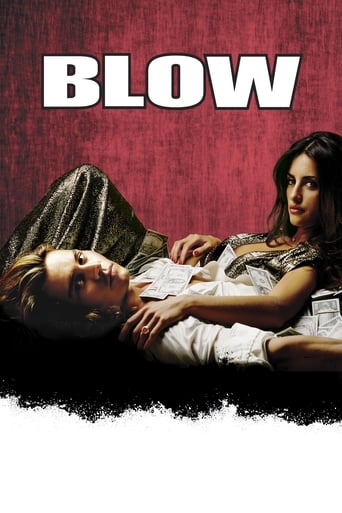
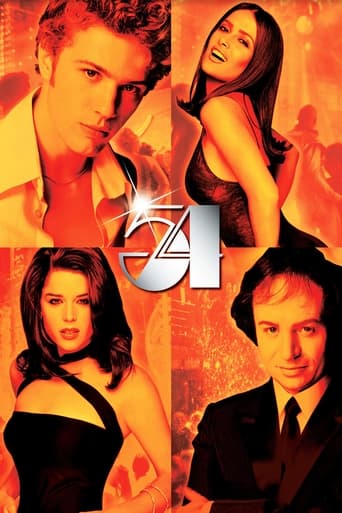
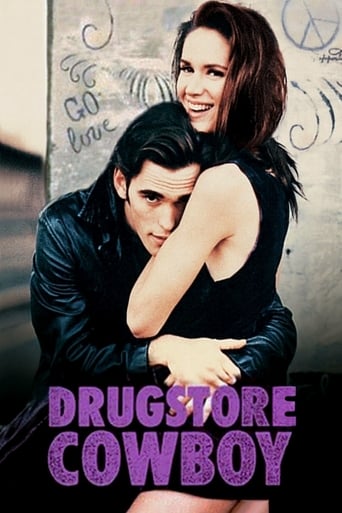
Reviews
Terrible acting, screenplay and direction.
Excellent, a Must See
It's fun, it's light, [but] it has a hard time when its tries to get heavy.
The plot isn't so bad, but the pace of storytelling is too slow which makes people bored. Certain moments are so obvious and unnecessary for the main plot. I would've fast-forwarded those moments if it was an online streaming. The ending looks like implying a sequel, not sure if this movie will get one
Marco Bellocchio takes a lot of chances in his films, examining human behavior in the face of dissension whether political, moral, or emotional. In 'Buongiorno, notte' ('Good Morning, Night') he studies the infamous 1978 kidnapping of Aldo Moro in what would be a situation that would raise as many questions as it gave answers - and it is that quality that Bellocchio has captured in his film.The facts of the Italian political current in 1978 may not be understood by the general viewer, but suffice it to say that the ruling political party Democrazia Cristiana was challenged by the Red Brigade, the underground terrorists who kidnapped and killed President Aldo Moro in a coups that was eventually destroyed by the reigning powers. That much of a plot is all that is necessary to know. The bulk of the film revolves around the lives of the kidnappers, especially the sole woman Chiara (Maya Sansa) who with her compatriots hid the President in a tiny room with the threat of death, but also were influenced by the writings and conversations with Moro. The whole question of revolution is under close inspection. The story mixes documentary shots with the cinematography in a tasteful way of showing us the elements of the kidnapping and the aftermath. It is the reaction of Chiara to these events and the questioning that can disrupt the political leanings of revolutionaries that makes this story so very meaningful.The cast is superb: Maya Sansa, Pier Giorgio Bellocchio, Giovanni Calcagno, Luigi Lo Cascio and Paolo Briguglia as the kidnappers, and Roberto Herlitzka as Aldo Moro are convincing and human. The script does have holes in it where formation of ideas and acts and incidents are vague, but it almost seems as though that is the intention of Bellocchio. In political upheaval nothing is black and white if the events are related through individual's eyes rather that through the reaction of the mobs. And this is what makes the film so fine, if a bit hard to follow.
This movie describes the 55 days of captivity of On. Aldo Moro, kidnapped by the Red Brigades in 1978. In rapid strokes, the Red Brigades are presented as a group bent on implementing a Marxist-Leninist revolution in Italy through the destabilization of the Republican democratic state in order to implement a Soviet style dictatorship. The Red Brigades were inspired by the Russian revolution and by the actions of Lenin and his Bolshevik followers. The maxim at the time was "Portare l'attacco al cuore dello stato", i.e. "Bring the attack to the heart of the state" and the Red Brigades extended their campaign of numerous targeted assassinations to those public figures that were trying to dilute the original message of the Marxist-Leninist revolution. On. Aldo Moro, President of the Christian Democratic Party, with his decade of attempts to mediate "Il Compromesso Storico" (The Historic Compromise), i.e., the entrance in the Government of politicians of the Italian Communist Party (Partito Comunista Italiano, PCI), was targeted, kidnapped and assassinated because he was close to succeed in his task. In the Red Brigade's view, the entrance of the PCI in the Government would have betrayed the Leninist dogma of proletarian revolution, and of the planned physical elimination of the middle class (Classe Borghese). Mr. Bellocchio does not delve too deeply into this essential motivations of the Red Brigades, and while he does not embellish their crime, he presents a superficial view of the political debate. I was in Italy when On. Moro was kidnapped and assassinated, and I remember very well those days. The Italian Communist Party (PCI) was very worried that the equation Communism-by-the-book = Red Brigades would cause a loss of votes for the party (30-35% of the electorate voted PCI) and the Italian Right (non-fascist) was too sleepy or ignorant to use the equation in the political debate, i.e. to suggest that communism was a bloody ideology that had at its core the destruction in a blood-bath of all the class enemies. Mr. Bellocchio does not present this political debate and prefers to continue the traditional and superficial approach: the Red Brigades were somewhat romantic criminal assassins. The film would have greatly improved had the most recent development on the significance of Communist Terrorism (especially the magisterial work of Richard Drake on the subject) in the 1960's and 1970's Italy been presented. Because it failed to refresh the trite and regimented view that the Red Brigades were a sort of political criminal folly, Mr. Bellocchio should be commended only because he is the only major movie director daring to dedicate a movie to the still not closed chapter of Marxist-Leninist terrorism in Italy. The movie was produced by the Italian State Television (RAI), and many of the RAI intellectuals are lefties: therefore it is not surprising that the fundamental violence of communism in all its forms had not been presented by the movie. In summary: commendable for reconstructing a painful chapter in the history of the Italian Democracy and for presenting a credible On.Aldo Moro, but missing the most updated debate on the subject and not adding much to the popular mythology.
#spoilers?Bellochio seems to be on a roll, after making L'ora di Religione he came up with another excellent film the next year, Buongiorno, Notte. In both films he mixes what's real and what's imaginary in a way that comforts. It doesn't fool or numb, but it cleanses. Buongiorno, Notte is about the kidnapping and murder of Aldo Moro, the conservative leader who 'threatened' the cold war settlement of the Italian state by favouring an understanding with the communist party. After Moro's kidnappers have carried him in a trunk into the flat, they find in one of his briefcases a screenplay called Buongiorno, Notte, which is the title of the film. Further on in the movie, a young would-be writer says he has written a screenplay titled, guess what, Buongiorno, Notte. Bellocchio is the director and also the author of the film's screenplay, so he slips himself into the plot, at least symbolically. But Bellocchio's alter ego has a life of his own and a thing for a girl who can be no other than the star, Chiara, one of the kidnappers. It is to Chiara that he confides the 'last-minute' changes he's made to the script and charges her with the responsibility to carry them out. Those changes can alter fiction but not history and symbolize what Moro should have been able to count on during those terrible days. Moro counted on nothing of the sort, he was murdered by the Red Brigades in 1978. He was caught, the film suggests, between the murderers and the cynics. Chiara is an imaginary wedge Bellocchio drives into reality to settle old scores with a history about which he's unsparing. In an interview, Bellocchio suggested the young writer could be Chiara's conscience, which is perfectly reasonable, but who if not the author could give his character such a conscience? The author does all he can to restore his character her lost nobility, a task Maya Sansa, the actress who plays Chiara, with her intense eyes and anguished feelings, makes so easy to accept. Despite all this talk, the movie is very easy to follow, uses sound in a manner close to clairvoyance and has many remarkable scenes.Among those, Chiara's black and white dreams or one involving an elevator in which the director, by displaying a perfect use of expressive resources, shows the impact of terrorism on Italian society. It's something of a master's touch.
I've read the other comments on this board and I would like to precise that Aldo Moro at the time was not the Italian President and that obviously the Red Brigades were out for his blood because he was working skilfully at a compromise between the Christian Democrats and the Communists and that meant for the extremists of the left to be cut out from any kind of power or hold they might have on the Government. The film itself does not seek to give political answers and is much more concerned with the human aspects of the drama. It's more lyrical than realistic... if you're looking for action or for a docudrama, you should probably go elsewhere.
